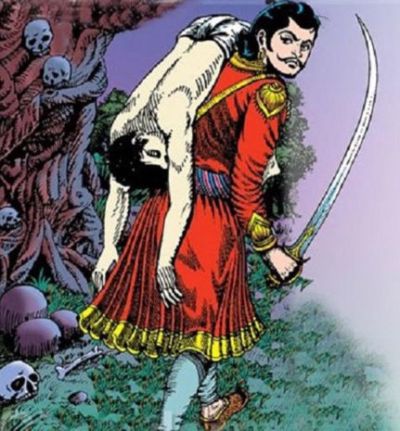“So tell me, o King, to whom did the princess Śaśiprabhā belong? To Manaḥsvāmin, or to Śaśin?
“Remember, if you know the answer, and don’t tell me the truth, your head will burst into a hundred pieces!“

तद् राजंस् त्वं मम ब्रूहि तावत् कस्योपपद्यते ।
भार्या सा संशयं छिन्धि पूर्वोक्तः समयो ऽस्ति ते ॥ १२,२२.१११ ॥
इति वेतालतः श्रुत्वा तस्मात् स्कन्धाग्रवर्तिनः
स त्रिविक्रमसेनस् तं नृपतिः प्रत्यभाषत ॥ १२,२२.११२ ॥
मन्ये शशिन एवासौ भार्या न्याय्या नृपात्मजा ।
यस्मै प्रदत्ता प्रकटं पित्रा धर्म्येण वर्त्मना ॥ १२,२२.११३ ॥
मनःस्वामी तु तां भेजे चौर्याद् गान्धर्वधर्मतः ।
चौरस्य तु परस्वेषु स्वत्वं न्याय्यं न जातु चित् ॥ १२,२२.११४ ॥
इति तस्य वचो निशम्य राज्ञो
वेतालः स ययौ पुनस् तद् एव ।
सहसैव तद् अंसतः स्वधाम
क्षितिपः सो ऽपि तम् अन्वियाय तूर्णम् ॥ १२,२२.११५ ॥
King Vikram replied…
“In my opinion, Śaśin is the rightful husband of the princess.”
“While both Śaśin and Manaḥsvāmin obtained her through deceitful methods, the princess was married to Śaśin in the right manner, with her father willfully giving her in marriage, and the marriage itself taking place with Vedic rites.”
“Manaḥsvāmin, on the other hand, was only about deceit. He cajoled the innocent princess and married her through gāndharva rites, and enjoyed her for some time, until he found another. He deceived the other girl too!”
“His character was flawed, and he was a crook, and a crook has no right to claim what is rightfully someone else’s.”
As the king uttered these words, the Vetāla flew off his shoulder, laughing. And King Vikram once more started to walk towards the banyan tree, determined to fetch him.
षोडशो वतेालः
The sixteenth story
The Sacrifice of Jīmūtavāhana
अथ गत्वा पुनः स्कन्धे वेतालं शिंशपाद्रुमात् ।
स त्रिविक्रमसेनस् तम् आदायोदचलत् ततः ॥ १२,२३.१ ॥
आगच्छन्तं च तं भूपं स वेतालो ऽब्रवीत् पुनः ।
राजञ् शृणु कथाम् एकाम् उदारां कथयामि ते ॥ १२,२३.२ ॥
King Vikram went back to the tree, and bringing down the Vetāla, placed him across his shoulders and started to walk back.
The Vetāla said to the king “O king, let me tell you another story!”
अस्तीह हिमवान् नाम नगेन्द्रः सर्वरत्नभूः ।
यो गौरीगङ्गयोस् तुल्यः प्रभवो हरकान्तयोः ॥ १२,२३.३ ॥
शूरासंस्पृष्टपृष्ठश् च यो मध्ये कुलभूभृताम् ।
अभिमानोन्नतः सत्यं गीयते भुवनत्रये ॥ १२,२३.४ ॥
तस्यास्ति सानुन्य् अन्वर्थं तत् काञ्चनपुरं पुरम् ।
न्यासीकृतम् इवार्केण रश्मिवृन्दं विभाति यत् ॥ १२,२३.५ ॥
जीमूतकेतुर् इत्य् आसीत् तस्मिन् पुरवरे पुरा ।
विद्याधरेश्वरः श्रीमान् मेराव् इव शतक्रतुः ॥ १२,२३.६ ॥
तस्यासीत् स्वगृहोद्याने कल्पवृक्षो ऽन्वयागतः ।
यथार्थनामा प्रथितो यो मनोरथदायकः ॥ १२,२३.७ ॥
तं प्रार्थ्य देवतात्मानं स राजा तत् प्रसादतः ।
प्राप जातिस्मरं पुत्रं बोधिसत्त्वांशसंभवम् ॥ १२,२३.८ ॥
दानवीरं महासत्त्वं सर्वभूतानुकम्पिनम् ।
गुरुशुश्रूषणपरं नाम्ना जीमूतवाहनम् ॥ १२,२३.९ ॥
संप्राप्तयौवनं तं च यौवराज्ये ऽभिषिक्तवान् ।
तनयं प्रेरितः सद्भिस् तद्गुणैः सचिवैश् च सः ॥ १२,२३.१० ॥
यौवराज्यस्थितश् चैषो जातु जीमूतवाहनः ।
हितैषिभिर् उपागत्य जगदे पितृमन्त्रिभिः ॥ १२,२३.११ ॥
On this earth, towards the north in Bhāratvarsha, is a great mountain named Himavat, where all the jewels of the earth are found. It is the origin of both Gaurī and Gaṅgā, the two Devis dear to Śiva.
Even the most courageous warriors cannot conquer it’s peaks, and it towers proudly over all other mountains. And so it’s praises are sung in the three worlds.
On a ridge in this great mountain, is a city named Kānchanapura (the city of gold), rightly named since the city gleams like a mass of the rays of the sun that have been deposited by Sūrya Deva on this earth.
Long back, in this majestic city, lived the king of the Vidyādharas, named Jīmūtaketu, like Indra lived on Mount Meru. In his vast palace he had a huge garden, and in the centre of that garden was a Kalpa-vrksha (wishing tree) that had been alive through many generations of the royal family.
It had been known to grant wishes of everyone who prayed to it with a devoted mind, and the king himself had prayed to it and obtained a son. This son was one who remembered his former births, and was a partial incarnation of Bodhisattva.
He was named Jīmūtavāhana. He was courageous and yet compassionate, and attentive to the teachings of his gurus.
When he grew up, his father made him crown prince, considering his noble qualities, and on the advice of his ministers.
And when Jīmūtavāhana was made crown prince, the ministers of his father, desiring his welfare, came to him and said…
to be continued…
